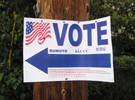
 Having participated in three major elections as a Massachusetts voter, what has intrigued me most about the voting process, besides the raised eyebrows I get from Cantabrigian poll workers when they see my party affiliation, is that no personal identification is required. When I arrive at the polling place in Quincy House, the election officials do not ask to see my driver’s license. They just verify that a “Peyton Miller” is registered in the precinct, hand me a ballot, and direct me to a voting booth. I realized after voting for the first time in 2008 that my roommate, who is from Kenya, could have claimed to be me and voted in my place.
Having participated in three major elections as a Massachusetts voter, what has intrigued me most about the voting process, besides the raised eyebrows I get from Cantabrigian poll workers when they see my party affiliation, is that no personal identification is required. When I arrive at the polling place in Quincy House, the election officials do not ask to see my driver’s license. They just verify that a “Peyton Miller” is registered in the precinct, hand me a ballot, and direct me to a voting booth. I realized after voting for the first time in 2008 that my roommate, who is from Kenya, could have claimed to be me and voted in my place.
In the Bay State, a photo ID is mandatory for tasks as mundane as buying a beer and acquiring a library card but is considered superfluous, or even poisonous to the most sacrosanct aspect of democracy. Fortunately, most states don’t see it that way. Thirty have instituted some form of identification requirement aimed at preventing voter fraud, and sixteen have passed laws requiring voters to present photo ID. This year has seen a trend toward tighter restrictions. Three states have passed new ID laws, and four others have upgraded to a photo ID requirement. By imposing a minor inconvenience on some citizens, these new laws will crack down on voter fraud and boost public confidence in American elections.
An identification requirement is a simple way of preventing voter impersonation (i.e., pretending to be a different voter), voting under a fictitious name, double voting by individuals registered in more than one state, and voting by illegal immigrants. While the extent of such fraud is disputed, it is known to occur on a sufficient level to tip the balance in close elections. In 2010, for example, a state representative election in Kansas City, Mo. was stolen when an interpreter at the polling place coached fifty Somali nationals to vote for one of the candidates, who ended up winning by one vote.
On a much larger scale, the Colorado secretary of state’s office recently found 11,805 aliens illegally registered to vote in the state, of whom nearly 5,000 had cast ballots in 2010. And in 2004, an investigation by the New York Daily News revealed that some 46,000 New Yorkers were registered in both New York and Florida, and between 400 and 1,000 of these had voted twice in at least one election. Recall that George W. Bush won Florida in 2000 by only 537 votes.
One reason the incidence of fraud appears sporadic, as the U.S. Seventh Circuit Appellate Court explained in upholding an Indiana ID law, is that the absence of identification requirements needed to detect voter fraud breeds “endemic underenforcement” of election laws. Perhaps just as important as upholding these laws is maintaining public faith in the democratic process. In the 2008 Cooperative Congressional Election Study, 62 percent of voters sampled thought voter fraud was very common or somewhat common. Authenticating voters’ identities at the polling place would help reverse this perception.
The elephant in the room is the true motivation behind such laws. Commentators from Bill Clinton to the National Association for the Advancement of Colored People to editorial pages across the country have characterized these tighter restrictions as a Republican plot to depress turnout among Democratic constituencies, particularly racial minorities.
Given this country’s history of racism, any revision of polling place procedures should be subject to scrutiny. But broad support for stronger voter ID laws makes the “scheming GOP” narrative hard to swallow. A Rasmussen poll from earlier this year found that 75 percent of likely voters nationwide, including 63 percent of Democrats, believe citizens “should be required to show photo identification” before voting. So does Rhode Island state representative Jon D. Brien, a Democrat who earlier this year shepherded a new voter ID law through an overwhelmingly Democratic legislature. Recently retired Alabama congressman Arthur G. Davis, an African-American who once opposed his state’s new photo ID requirement, now supports the law as an antidote to the voter fraud he has witnessed in parts of the Black Belt.
These restrictions create another bureaucratic hoop for some voters to jump through, but comparing them to Jim Crow laws, as the NAACP’s Benjamin Jealous and others have done, is quite a stretch. Organizations on different sides of the issue have produced varying estimates of the number of eligible voters who lack a photo ID. But regardless of the true number of such citizens, those who wish to vote need only obtain proper identification from a government office, a service offered free of charge to those unable to pay.
Reasonable people can distinguish between these laws, which merely compel some citizens to stand in line at the post office and the literacy tests and grandfather clauses of the Jim Crow South. In Congressman Davis’s words, voter ID requirements are “unlikely to impede a single good faith voter.” While they are an inconvenience to some, these laws are an effective way of protecting the most fundamental component of our form of government.
Peyton R. Miller is a columnist for the Harvard Crimson. He is a contributor to The College Fix.
Photo credit: hjl (Flickr Creative Commons)
Like The College Fix on Facebook / Follow us on Twitter





Please join the conversation about our stories on Facebook, Twitter, Instagram, Reddit, MeWe, Rumble, Gab, Minds and Gettr.